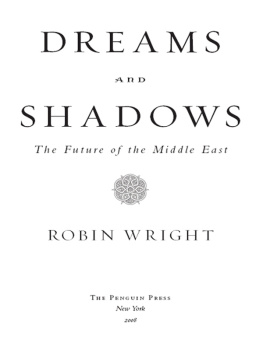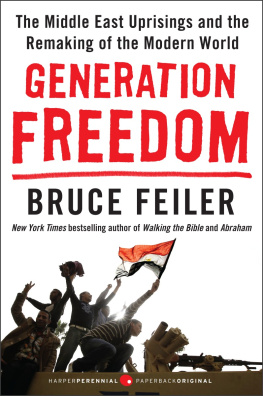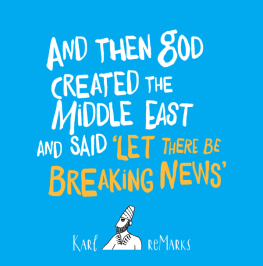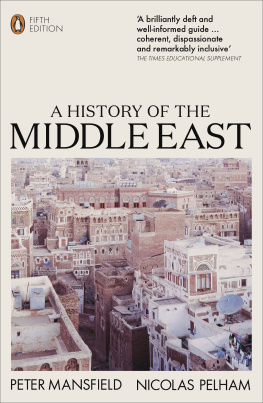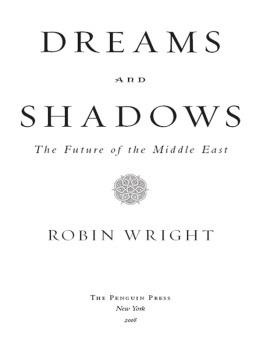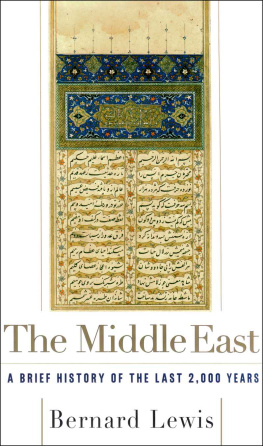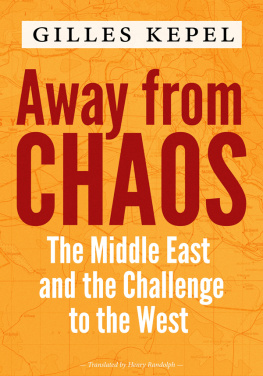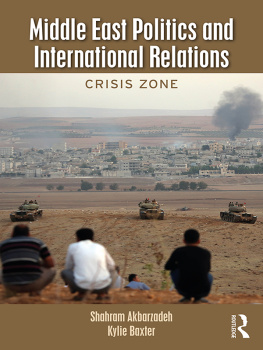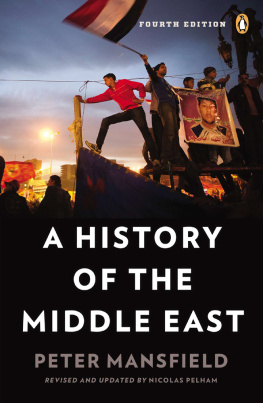DREAMS AND SHADOWS
The Future of the Middle East
ROBIN WRIGHT
T HE P ENGUIN P RESS
New York
2008
THE PENGUIN PRESS
Published by the Penguin Group
Penguin Group (USA) Inc., 375 Hudson Street, New York, New York 10014, USA Penguin Group (Canada), 90 Eglinton Avenue East, Suite 700, Toronto, Ontario, Canada M4P 2Y3 (a division of Pearson Penguin Canada Inc.) Penguin Books Ltd, 80 Strand, London WC2R 0RL, England Penguin Ireland, 25 St. Stephens Green, Dublin 2, Ireland (a division of Penguin Books Ltd) Penguin Books Australia Ltd, 250 Camberwell Road, Camberwell, Victoria 3124, Australia (a division of Pearson Australia Group Pty Ltd) Penguin Books India Pvt Ltd, 11 Community Centre, Panchsheel Park, New Delhi110 017, India Penguin Group (NZ), 67 Apollo Drive, Rosedale, North Shore 0632, New Zealand (a division of Pearson New Zealand Ltd) Penguin Books (South Africa) (Pty) Ltd, 24 Sturdee Avenue, Rosebank, Johannesburg 2196, South Africa
Penguin Books Ltd, Registered Offices:
80 Strand, London WC2R 0RL, England
First published in 2008 by The Penguin Press,
a member of Penguin Group (USA) Inc.
Copyright Robin Wright, 2008
All rights reserved
Library of Congress Cataloging-in-Publication Data
Wright, Robin B., 1948
Dreams and shadows: the future of the Middle East /Robin Wright.
p. cm.
Includes bibliographical references and index.
ISBN: 978-1-1012-0276-0
1. Middle EastPolitics and government21st century. I. Title.
DS44.W87 2008
956.05'4dc22
2007046267
Map by Jeffrey L. Ward
Without limiting the rights under copyright reserved above, no part of this publication may be reproduced, stored in or introduced into a retrieval system, or transmitted, in any form or by any means (electronic, mechanical, photocopying, recording or otherwise), without the prior written permission of both the copyright owner and the above publisher of this book.
The scanning, uploading, and distribution of this book via the Internet or via any other means without the permission of the publisher is illegal and punishable by law. Please purchase only authorized electronic editions and do not participate in or encourage electronic piracy of copyrightable materials. Your support of the authors rights is appreciated.
For my wondrous Nani
A ll men dream: but not equally. Those who dream by night in the dusty recesses of their minds wake in the day to find that it was vanity. But the dreamers of the day are dangerous men, for they may act their dream with open eyes, to make it possible.
T. E. L AWRENCE, S EVEN P ILLARS OF W ISDOM
I am certain that this night of darkness will not last. The moon of freedom will emerge from behind the clouds of religious tyranny.
I RANIAN DISSIDENT A KBAR G ANJI, IN A LETTER FROM PRISON ON THE FORTY-THIRD DAY OF A HUNGER STRIKE , J ULY 23, 2005


PROLOGUE
THE MIDDLE EAST
The Prospects
Were coming out of a bad millennium in the Arab world.
P ALESTINIAN POLITICAL ANALYST R AMI K HOURI
We have learned that we have to gain our freedom ourselves, and that only we can nourish that freedom and create a political system that can sustain it. Ours is a difficult struggle; it could even be a long one.
I RANIAN DISSIDENT A KBAR G ANJI 1
O n a warm spring day in April 1983, I stood across from what had been the United States Embassy in Beirut and watched as rescuers picked through tons of mangled steel and concrete littered with glass shards. Tenderly, emergency crews put salvaged bits of bodies in small blue plastic bags. Forensic experts later matched up the pieces so they could be buried together. More than sixty Americans were killed in that lunchtime bombing.
Some of the dead had been my friends.
The attack was the first by a Muslim suicide bomber against an American targetanywhere in the world. Over the next eighteen months, Islamic extremists blew up a second American embassy and the U.S. Marine peacekeeping compound in Lebanon. The Marine bombing is still the largest loss of American military life in a single incident since World War II, larger than any attack in Vietnam or Iraq. I heard those bombs thunder through Beirut too and again watched weeks of rescue efforts. The three terrorism spectaculars marked a turning point for the Middle East.
Since then, Islamic extremism has progressively grown into the most energetic force in the Middle Eastand the gravest threat to Western interests. Out of my own sense of anguish, I tracked the trend as it unfolded in country after country and wrote one of the first books, in 1985, about this new form of sacred rage that has since redefined the worlds political divide. Fear of its explosive potential will define American foreign policy for years, potentially decades, to come. Al Qaeda and a growing array of offshoots continue to push their tentacles deeper throughout the regionand beyond.
Yet a generation later, Islamic extremism is no longer the most important, interesting, or dynamic force in the Middle East. The hard-core terrorists in al Qaeda or Islamic Jihad have repeatedly proven that they can destroy. But they have yet to provide tangible solutions or viable new models for problems plaguing the region.
In the early twenty-first century, a budding culture of change is instead imaginatively challenging the status quoand even the extremists. New public voices, daring publications, and increasingly noisy protests across two dozen countries are giving shape to a vigorous, if disjointed, trend. It includes defiant judges in Cairo, rebel clerics in Tehran, satellite television station owners in Dubai, imaginative feminists in Rabat and the first female candidates in Kuwait, young techies in Jeddah, daring journalists in Beirut and Casablanca, and brave writers and businessmen in Damascus.
For all, peaceful empowerment has become the preferred means of making political decisions and producing change.
The tiny minority willing to go out and kill has had such impact in part because there have been so few other political ideas and activists in the region offering alternatives. Now, increasingly, there are. A trend struggling for decades to take root has finally begunand, I stress, only begunto have impact.

